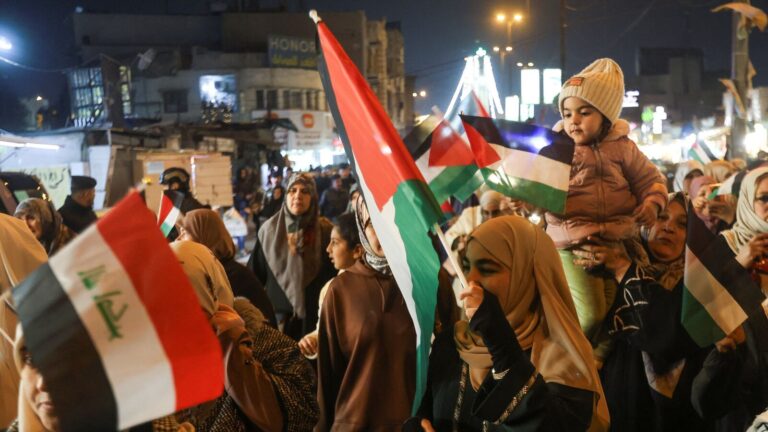Shortly after Iraq launched its first drone toward Israel on November 8, Iraqi militias released images of missiles flying across the sky. Israel said its air defenses had thwarted an attack by al-Nujaba (‘Nobles’) and said: ‘There will be a great surprise in the coming hours.’ “Many things will happen,” he promised.
Most rulers of the Middle East, including Iran’s allies, hope that God has other plans. Iraq has been doing pretty well lately. Finally, oil revenues are being used to fund infrastructure rather than sectarian wars or foreign slush funds. Violence is at its lowest level since the American invasion. Officials are desperate to avoid conflict between Israel and Iran.
However, their efforts are hampered by their inability to control their territory. Israel said Iran was funneling new stockpiles of long-range missiles and explosive drones to local militias. Iran is furious that the US allowed Israel to use Iraqi airspace to bomb Iraq. Iraq could then become drawn into Israel’s regional war.
For now, Iraq is relying on diplomacy to save it. On November 10, the National Security Adviser visited Iran and met with the Quds Force, the external operations arm of Iran’s Islamic Revolutionary Guards Corps (IRGC). He called on the country’s leaders to remove Iraq from Iran’s plan to attack Israel in retaliation for the October 26 airstrike. On the same day, Iraqi Prime Minister Mohammed al-Sudani met with Saudi Crown Prince Mohammed bin Salman in Riyadh to discuss ways to prevent the war from escalating. Meanwhile, the country’s top cleric, Grand Ayatollah Ali al-Sistani, has instructed the Iraqi state to take control of militia groups’ weapons.
But Iran worries that Israeli attacks on its air defenses and its proxy forces, long considered the first line of defense, leave it vulnerable. Until recently, Iran has shown what it calls “strategic patience” and absorbed Israeli blows. But Israel’s attacks on Hezbollah, Iran’s proxy in Lebanon, and its invasion of Lebanon have taught Iran that restraint appears weak and will only invite further aggression. After Iran fired two volleys of rockets, Iranian officials hope they can use Iraq to shield them from Israeli counterattacks. Because Iraq is close to Israel, Israeli air defenses would have less time to intercept attacks.
Until recently, Israel relied on U.S. forces on land and at sea to thwart Iranian-backed militias in places like Iraq and Yemen. But the rout of Hamas and Hezbollah and airstrikes on Syria emboldened leaders to target Iran’s remaining “axis of resistance.” Israeli security forces say they will carry out a pre-emptive strike before Iraqi militias unleash a “big surprise attack.” .
Iran has two allies in Shiite-majority Iraq. The first is the Shi’ite faction that began building after the United States overthrew Iraqi dictator Saddam Hussein in 2003 and took control of the Iraqi state in elections since then. In 2014, with help from Iran, they formed Iraq’s state-funded militia, the Popular Mobilization Forces (PMF).
However, as these blocs became increasingly driven by internal Iraqi interests, Iran sponsored new militias, such as al-Nujaba, under its direct command. After Israel invaded Gaza, Iran supported the creation of the Iraqi Islamic Resistance Movement (iri). This is another militia group that is funded and supplied by Iran. Since then, it has fired dozens of rockets and drones into Israel and attacked U.S. military bases. Israel’s killing of Hamas and Hezbollah commanders created a vacuum in the Axis Arab leadership. Some Iraqi militia members may be eager to fill the void.
Iraqis have long sought to rid their country of American and Iranian foreign forces. They can’t do either. So in exchange for moving away from the US and Iran, Iraqi factions want to stay away from the fighting. PMF commanders assured Sudani that they would not use state-funded weapons or fighter jets to attack Israel. The fallout in Iraq could be limited if Israel limits its attacks to Ili and avoids hitting population centers, but if Israel were to attack near Iraq’s Shiite holy city of Ili, If they attack or Ili attacks, it may be difficult to contain them. PMF. Privately, some Shiites may support strikes against non-PMF militias. “These groups are just criminals and thieves. All Iraqis know that they are just employees of Iran,” said a graduate of Sistani’s seminary.
America also wants to separate Iraq from Iranian influence. On November 11, American forces attacked pro-Iranian militias in Syria near the Iraqi border. Donald Trump may go even further if he becomes president. During his last term in office, he ordered the killing of then-PMF commander Abu Mahdi al-Muhandis and Iran’s top commander Qasem Suleimani in Baghdad. There are similar concerns for Iraq, and Trump’s advisers may be considering sanctions against Iraq. Since 2003, Iraq has kept its oil revenues in an escrow account in New York. Iraq observers in Washington recently said that Trump may be considering it, too.
Unauthorized reproduction is prohibited. Published under license by The Economist. Original content available at www.economist.com.


